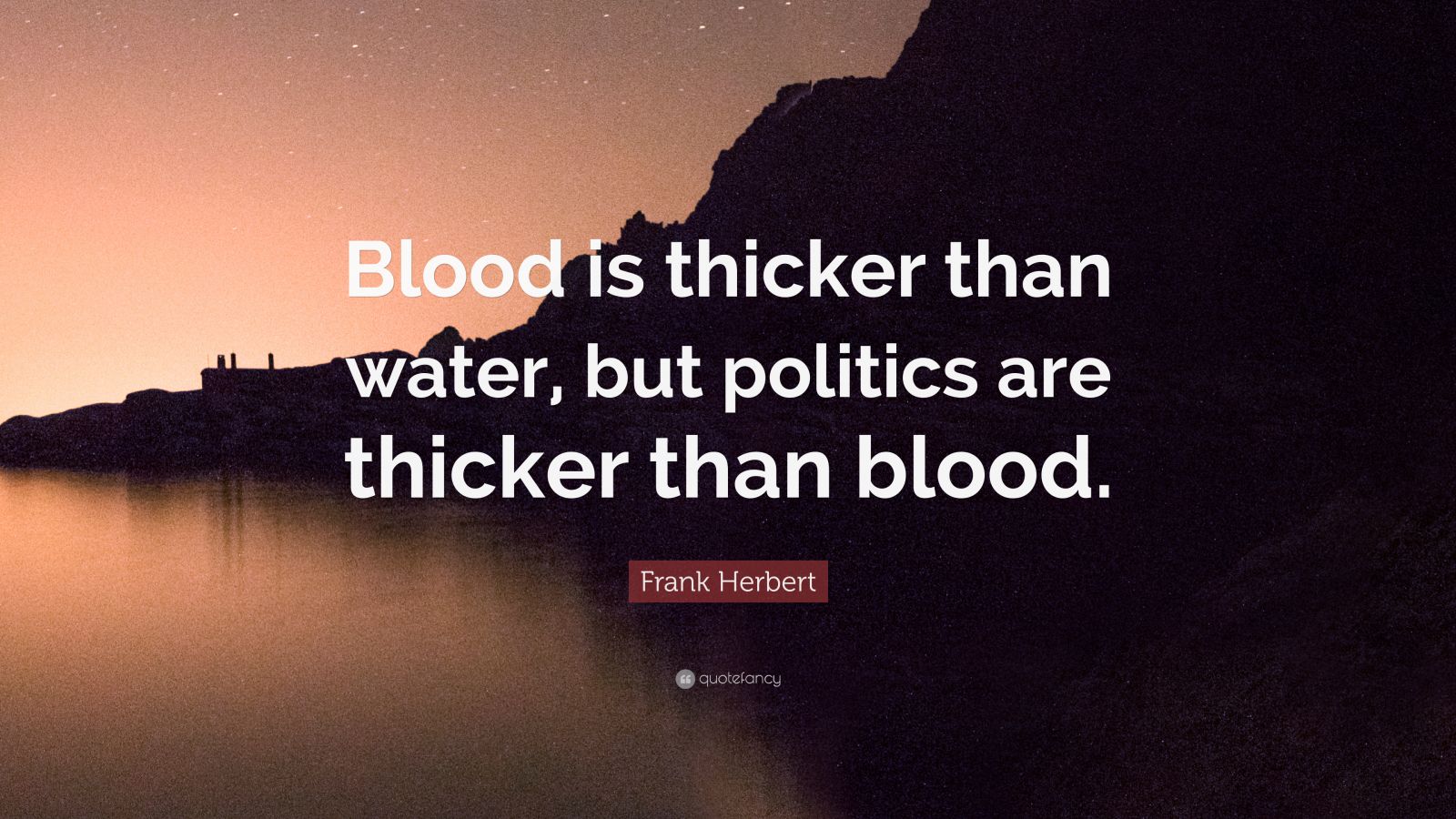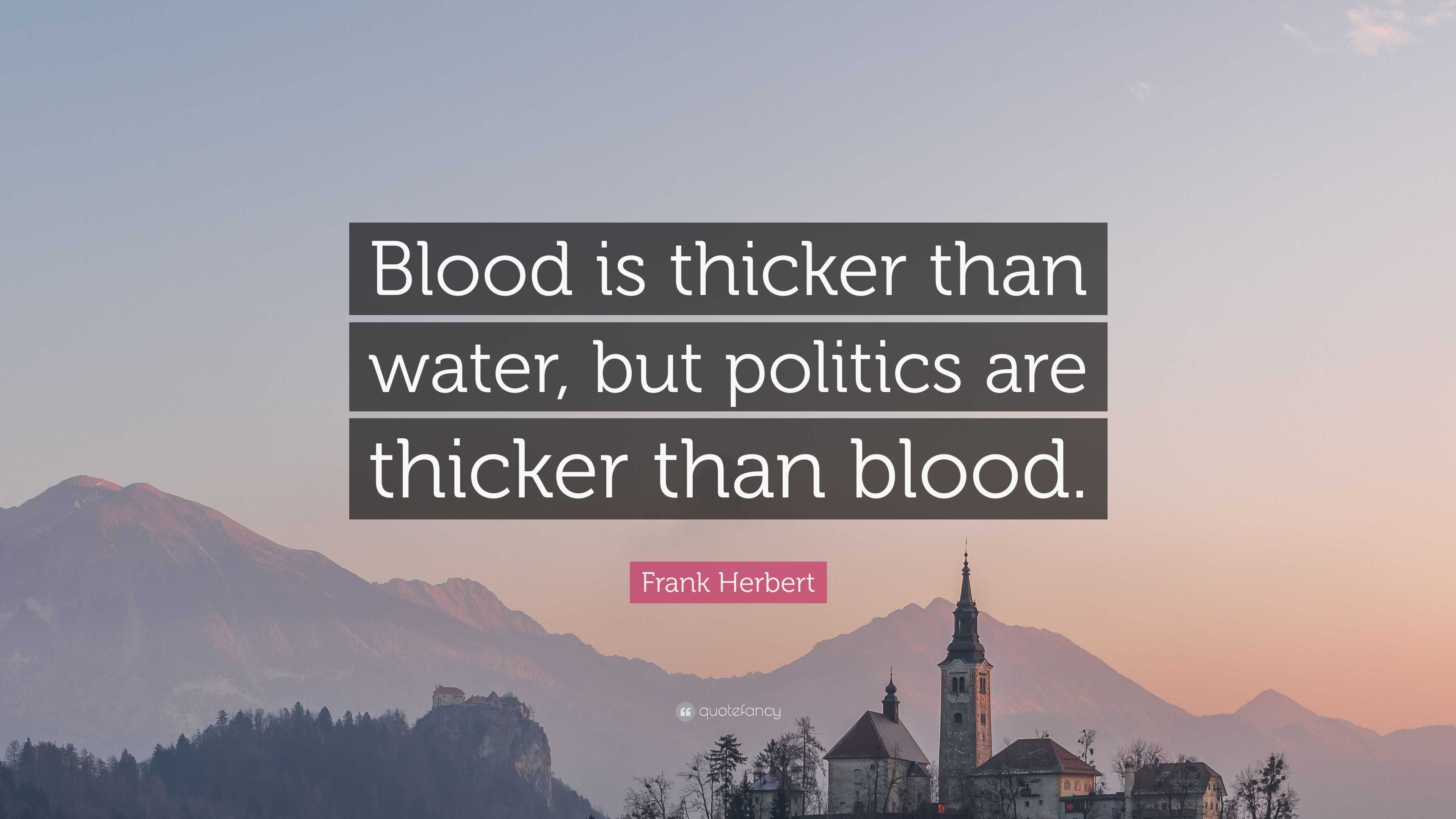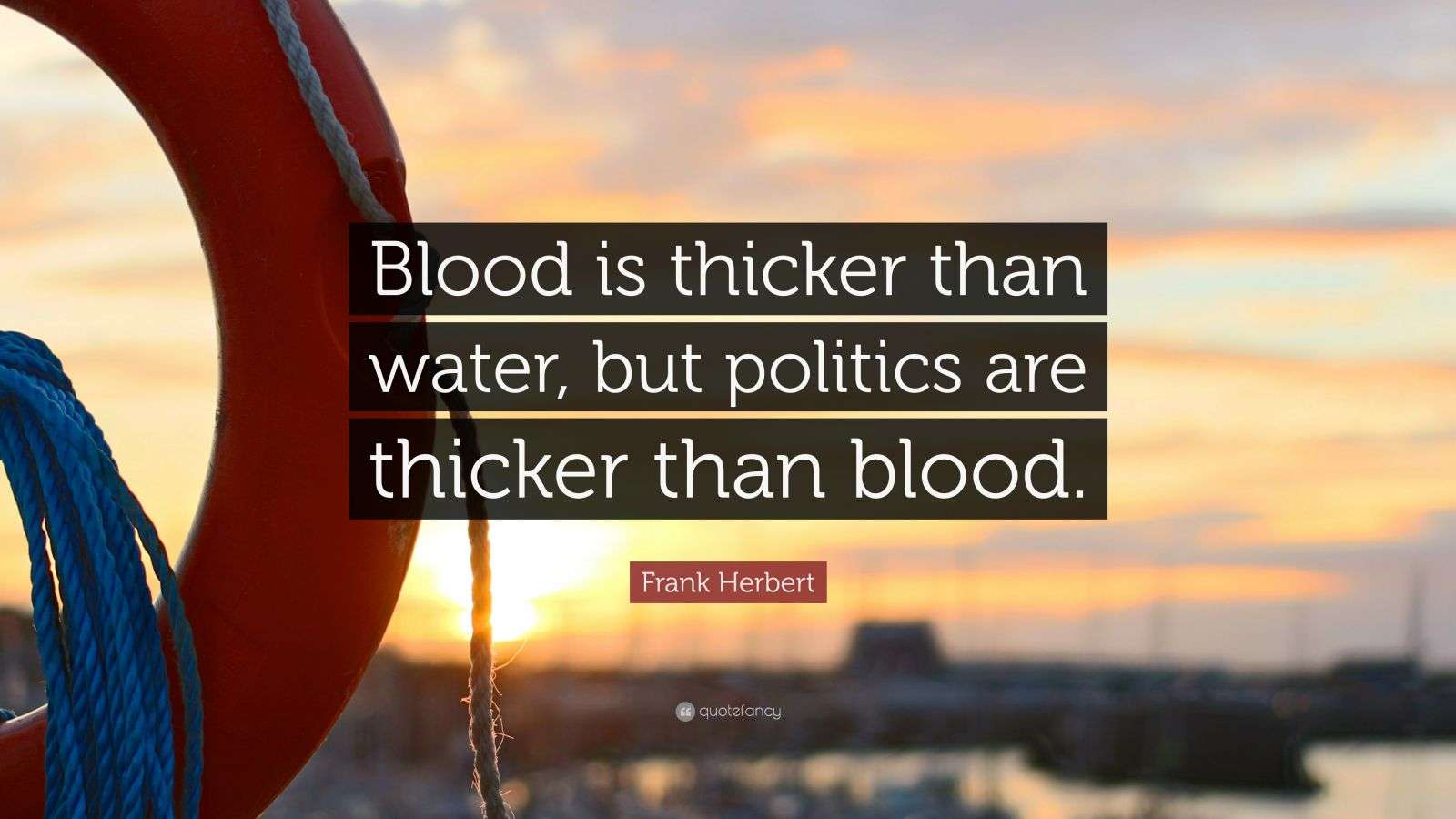You’ve probably heard the saying "blood is thicker than water" countless times. Maybe it was your grandma dropping wisdom during family gatherings or a friend trying to emphasize the importance of family bonds. But have you ever wondered where this phrase actually comes from? What’s the full quote behind it, and why does it matter? Well, buckle up because we’re about to dive deep into the origins, meanings, and everything you need to know about this timeless saying.
This isn’t just some random phrase people throw around. "Blood is thicker than water" carries centuries of history and cultural significance. Whether you’re looking to impress your friends with trivia or genuinely curious about its roots, this article will give you the full scoop.
From ancient proverbs to modern interpretations, this saying has evolved over time. So, let’s get started and unravel the mystery behind "blood is thicker than water full quote." Trust me, by the end of this, you’ll have more than just a phrase—you’ll have a story.
Read also:Exploring 5movierulz 2025 Download A Comprehensive Guide
What Does "Blood is Thicker Than Water" Really Mean?
Let’s break it down. The phrase "blood is thicker than water" is often used to highlight the unbreakable bond between family members. It suggests that family ties are stronger and more important than any other relationships, even those formed through shared experiences or friendships. But is that all there is to it?
Interestingly, the meaning of this saying has shifted over time. Originally, it wasn’t about family at all. In fact, the earliest versions of the phrase were more about loyalty and brotherhood among comrades. Yep, you read that right. The "blood" in the original context referred to bloodshed in battle, not biological connections.
Origins of the Phrase
So, where did this phrase come from? The earliest known version dates back to ancient Mesopotamia. The saying "the blood of the covenant is thicker than the water of the womb" was used to describe the sacred bonds formed between warriors who had fought side by side. These bonds were considered more significant than familial ties.
Later, the phrase made its way into European culture through translations and interpretations. By the 12th century, it had been adapted into Latin as "sanguis et aqua," which roughly translates to "blood and water." Over time, the meaning shifted to emphasize family relationships, leading to the modern interpretation we know today.
Unpacking the Full Quote
Now, let’s talk about the full quote. While "blood is thicker than water" is the most commonly used version, the original saying is much longer and richer in meaning. The full quote, depending on the source, can vary slightly, but it generally goes like this:
"The blood of the covenant is thicker than the water of the womb." This version emphasizes the idea that bonds formed through shared struggles and sacrifices are stronger than those based solely on biology.
Read also:Exploring The World Of Vegamovie A Comprehensive Guide
Another variation is: "Blood is thicker than water, but the water of the womb is thicker than the blood of the covenant." Confusing, right? This version suggests that while loyalty and brotherhood are important, family ties ultimately take precedence.
Why Does the Full Quote Matter?
Understanding the full quote gives us a deeper appreciation of the complexities behind this saying. It’s not just about family; it’s about the different layers of relationships and the values we prioritize in life. Whether it’s the bonds of friendship, the ties of family, or the loyalty of comrades, each plays a crucial role in shaping who we are.
Think about it. Have you ever had a friend who felt more like family than actual relatives? Or maybe you’ve experienced the camaraderie of teammates or coworkers who’ve got your back no matter what. These relationships remind us that "blood is thicker than water" isn’t a one-size-fits-all rule—it’s a reminder to cherish all the meaningful connections in our lives.
The Evolution of the Phrase Over Time
Like many sayings, "blood is thicker than water" has undergone significant changes throughout history. In medieval times, it was closely tied to chivalry and the code of honor among knights. During the Renaissance, it became associated with familial loyalty and the importance of maintaining family legacies.
Fast forward to the modern era, and the phrase has taken on a more personal meaning. Today, it’s often used to encourage people to prioritize family relationships, even when they’re challenging. However, some argue that this interpretation oversimplifies the complexity of human connections.
Modern Interpretations
In today’s world, "blood is thicker than water" can mean different things to different people. For some, it’s a reminder to stay close to family, no matter what. For others, it’s a call to action to redefine what "family" means in a broader sense.
Here are a few modern takes on the phrase:
- Family is more than just biology—it’s about the people who choose to stand by you.
- Blood ties may be strong, but so are the bonds formed through shared experiences and love.
- Sometimes, the "water of the womb" isn’t as important as the "blood of the covenant."
Why Is This Saying So Popular?
There’s something about "blood is thicker than water" that resonates with people across cultures and generations. Maybe it’s the simplicity of the phrase or the universal truth it conveys. Whatever the reason, this saying has stood the test of time.
One reason for its popularity is its adaptability. Whether you’re talking about family, friendship, or loyalty, this phrase can be applied to almost any situation. It’s also a great conversation starter, sparking debates about the nature of relationships and the values we hold dear.
Pop Culture References
If you’ve watched movies, read books, or listened to music, chances are you’ve encountered this phrase in some form. From Shakespearean plays to modern TV shows, "blood is thicker than water" has been a recurring theme in storytelling.
For example, in the popular TV series "Game of Thrones," the phrase is often used to highlight the complicated relationships between characters. Similarly, in literature, authors like Charles Dickens and Mark Twain have explored the tension between family loyalty and personal freedom through this saying.
Does Blood Really Have to Be Thicker?
While "blood is thicker than water" is a beautiful sentiment, it’s not without its controversies. Some argue that prioritizing family above all else can lead to toxic relationships and missed opportunities for growth. Others believe that the phrase reinforces outdated notions of family loyalty at the expense of individual happiness.
So, does blood really have to be thicker? That’s a question only you can answer. Ultimately, it’s about finding a balance between honoring your roots and embracing new connections.
Alternatives to the Phrase
If you’re looking for a more inclusive way to express the importance of relationships, here are a few alternatives:
- "The people who matter most are the ones who choose to stand by you."
- "Family is more than blood—it’s the people who love and support you."
- "Loyalty and trust are the bonds that truly matter."
How to Apply This Saying in Real Life
Now that you know the history and meaning behind "blood is thicker than water," how can you apply it to your own life? Here are a few practical tips:
First, take a moment to reflect on your relationships. Who are the people you consider family, whether by blood or by choice? How can you strengthen those bonds? Second, think about the values that matter most to you. Is it loyalty, love, or something else entirely? Finally, don’t be afraid to redefine what "family" means to you. Sometimes, the best relationships are the ones that evolve over time.
Practical Examples
Let’s say you’re facing a difficult decision, like moving to a new city or starting a new job. How does "blood is thicker than water" apply? Well, it might mean consulting your family for advice or leaning on your closest friends for support. It could also mean trusting your instincts and making a choice that aligns with your personal values.
Here’s another example. Imagine you’re in the middle of a family conflict. Instead of letting the situation escalate, you could use this saying as a reminder to prioritize understanding and communication. After all, family is about more than just blood—it’s about love and respect.
Final Thoughts
As we wrap up this deep dive into "blood is thicker than water full quote," it’s clear that this saying is more than just a catchy phrase. It’s a reflection of the complex relationships that shape our lives. Whether you interpret it as a call to family loyalty or a reminder to cherish all meaningful connections, the message is clear: relationships matter.
So, what’s next? Take a moment to think about the people who matter most to you. Whether they’re family by blood or by choice, make sure to let them know how much they mean to you. And if you enjoyed this article, don’t forget to share it with your friends and family. Who knows? You might just inspire someone to rethink their own relationships.
Call to Action
Got thoughts on "blood is thicker than water"? Let us know in the comments below! Share your favorite quotes, stories, or even disagreements with this saying. The more we talk about it, the more we learn from each other.
Table of Contents


